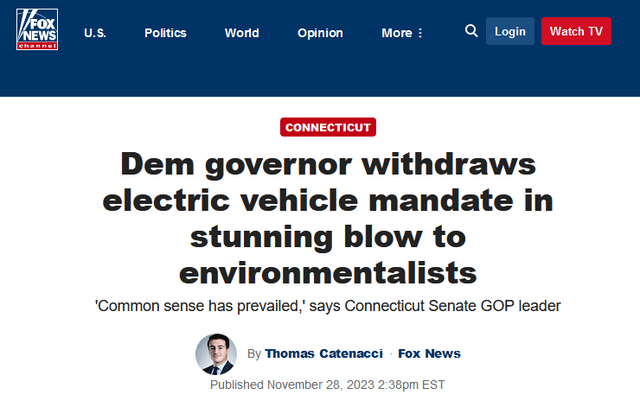Car Dealers Reiterate Concerns Over Electric Vehicle Regulations

Table of Contents
High Initial Investment Costs for EV Infrastructure
The transition to EVs presents significant financial hurdles for car dealerships. Adapting to this new technology requires substantial upfront investment in infrastructure and training.
Showroom Upgrades and Training
Upgrading showrooms to accommodate EVs is a costly endeavor. Dealerships must invest in:
- Fast chargers: Installation of fast-charging stations requires significant electrical upgrades and specialized expertise.
- Specialized EV maintenance equipment: Tools and diagnostic equipment for servicing EV batteries, motors, and other components are expensive and require specialized training.
- Employee training: Technicians need extensive training to work safely and effectively with high-voltage systems and complex EV technology. This includes certification programs and ongoing professional development.
These expenses represent a considerable financial burden, particularly for smaller dealerships with limited resources.
Inventory Challenges
Managing EV inventory poses unique challenges. Unlike traditional vehicles, EVs often have longer lead times and higher upfront costs. This leads to:
- Higher storage costs: EVs may require specific charging and climate-controlled storage, increasing operational expenses.
- Demand forecasting difficulties: Accurately predicting demand for specific EV models is challenging due to the evolving market and technological advancements. Overstocking or understocking can both severely impact profitability.
Lack of Government Support for Infrastructure Development
The lack of sufficient government support exacerbates the financial strain on dealerships. Substantial incentives are needed to offset the costs of EV infrastructure upgrades. This includes:
- Grants and subsidies: Direct financial assistance to help dealerships cover the costs of installing charging stations and purchasing specialized equipment.
- Tax breaks and credits: Tax incentives to encourage investments in EV infrastructure and training.
- Low-interest loans: Access to affordable financing to make EV infrastructure upgrades more manageable.
The Impact of EV Sales Targets and Quotas
Dealerships are facing intense pressure to meet aggressive EV sales targets imposed by manufacturers, often irrespective of local market realities.
Unrealistic Sales Goals
Manufacturers are setting ambitious EV sales quotas, which can be unrealistic in regions with lower consumer demand or limited charging infrastructure. This disproportionately impacts smaller dealerships with limited resources and geographic reach. Examples include:
- Rural areas with limited EV adoption rates struggling to meet urban-centric sales targets.
- Dealerships in regions with limited public charging infrastructure facing difficulty selling EVs.
Penalties for Non-Compliance
Failure to meet these mandated EV sales quotas can result in severe penalties, impacting dealership profitability and reputation:
- Financial penalties imposed by manufacturers for not achieving sales targets.
- Reduced allocation of popular EV models, impacting sales revenue.
- Damage to the dealership's reputation and standing within the manufacturer's network.
Lack of Consumer Demand in Certain Markets
The uneven distribution of consumer demand for EVs across different regions creates significant challenges:
- Urban areas generally show higher EV adoption rates compared to rural areas.
- Income levels significantly influence EV purchase decisions.
- Consumer preferences vary widely, impacting the demand for specific EV models.
Concerns Regarding the Complexity of EV Technology and Maintenance
The complexity of EV technology presents significant challenges for dealerships in terms of training, parts availability, and warranty concerns.
Specialized Training Requirements
Servicing and repairing EVs demands highly specialized training for technicians, increasing costs for dealerships:
- Extensive training courses covering high-voltage systems, battery management, and specialized diagnostic procedures are needed.
- Certification programs are expensive and require ongoing updates as EV technology rapidly evolves.
- The cost of training and maintaining technician expertise is a substantial ongoing expense.
Limited Availability of Parts and Repair Resources
Dealerships face challenges in sourcing specialized EV parts and accessing reliable repair resources:
- Longer lead times for parts compared to traditional vehicles.
- Higher costs for specialized tools and equipment necessary for EV repairs.
- Limited access to specialized repair expertise.
Warranty Concerns and Liability
The complex technology of EVs introduces new warranty concerns and potential liability issues:
- Increased risk of complex and costly repairs.
- Higher labor costs associated with diagnosing and resolving EV-specific issues.
- Potential for increased warranty claims due to the complexity of the technology.
Conclusion: Addressing the Concerns Surrounding Electric Vehicle Regulations
The transition to an EV-centric automotive industry presents substantial challenges for car dealerships. The high initial investment in infrastructure, unrealistic sales targets, and the complexity of EV technology and maintenance are significant concerns. Government support is crucial to facilitate a smooth transition, providing incentives to encourage investment in EV infrastructure, alleviate the burden of unrealistic sales targets, and support the training and development of EV technicians. Understanding the issues surrounding electric vehicle regulations is crucial for a smooth transition to a sustainable automotive future. Let’s work together to create policies that address these concerns and support the vital role car dealerships play in this transformation.

Featured Posts
-
 Parkland School Board Necessary Changes But Not Revolutionary Overhaul
Apr 30, 2025
Parkland School Board Necessary Changes But Not Revolutionary Overhaul
Apr 30, 2025 -
 The Economic Fallout Examining The Consequences Of Federal Funding Cuts In Trump Country
Apr 30, 2025
The Economic Fallout Examining The Consequences Of Federal Funding Cuts In Trump Country
Apr 30, 2025 -
 Dasmoi Trump I Ekklisi Toy Le Maire Gia Patriotismo Stis Gallikes Epixeiriseis
Apr 30, 2025
Dasmoi Trump I Ekklisi Toy Le Maire Gia Patriotismo Stis Gallikes Epixeiriseis
Apr 30, 2025 -
 Family Demands Answers After Inmates Hours Long Torture In San Diego Jail
Apr 30, 2025
Family Demands Answers After Inmates Hours Long Torture In San Diego Jail
Apr 30, 2025 -
 Blue Ivys Face Says It All Fans React To Beyonces Grammy Triumph
Apr 30, 2025
Blue Ivys Face Says It All Fans React To Beyonces Grammy Triumph
Apr 30, 2025
